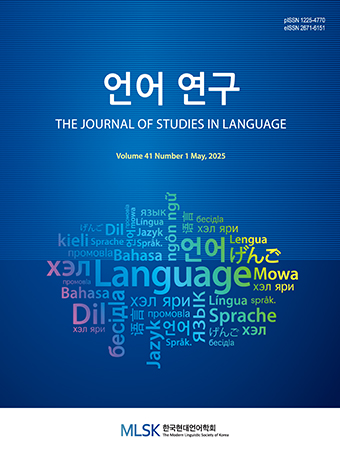Research Article
Abstract
References
Information
The purpose of this study is to examine phonological variations of internet-based Korean language use. A review of data revealed variations in the consonants and vowels, and the syllable structure of a word. First, online language users tend to employ a polite speech style ending with -yeo instead of –yo, and the diphthong, /wə/ was also monophthongized into either /ə/ or /o/. Second, the nasal consonants /m/ or /ŋ/ were added into a syllable final position of a CV syllable, yielding a CVC syllable It was also found that the nasal /m/ was used in the deferential speech style with the omission of the middle syllable of -sup-ni-da, resulting in –sum-da. It is suggested that online Korean language users employ those phonological variations to deliver solidarity and intimacy to the addressee, establishing specific linguistic forms in an online speech community.
- Ahn, M. 2019. Linguistic and Nonlinguistic Politeness Strategies in Korean Internet Discourse. Discourse and Cognition 26.2, 49-66. 10.15718/discog.2019.26.2.49
- Dino, A., S. Reysen., and N. Branscombe. 2009. Online Interactions between Group Members Who Differ in Status. Journal of Language and Social Psychology 28.1, 85-93. 10.1177/0261927X08325916
- Golato, A. and C. Taleghani-Mikazm. 2006. Negotiation of Face in Web Chats. Multilingua 25.3, 293-321. 10.1515/MULTI.2006.017
- Jung, K.-E. 2019. A Study on the Use of Interrogative Final Endings ‘-eun ga yo’ and ‘-na yo’ for Korean Language Education-Focused on Internet Question and Answer Bulletin Boards. URIMALGEUL:The Korean Language and Literature 82, 275-309.
- Kang, W. 2005. Spoken Properties of On-Line Chat and Differences from the Spoken Language. Linguistic Research 22.2, 1-22.
- Kim, J.-B. and P. Sells. 2007. Korean Honorification: A Kind of Expressive Meaning. Journal of East Asian Linguistics 16, 303-336.10.1007/s10831-007-9014-4
- Lee, J.-B. 2012. Usages, Research Trends, and Challenges of Net-language in the Smart-phone Era. The Sociolinguistic Journal of Korea 20.1, 177-211.
- Lee, I. and R. Ramsey. 2000. The Korean Language. Albany: State University of New York Press.
- Park, C. 2009. The Use of Polite Verbal Suffix -yo and -yeo in Korean Internet Cafe. Eoneohag 57, 23-36.
- Park, C. 2010. Language Styles of Korean in Chat-rooms. Studies in the Linguistic Sciences: Illinois Working Papers, 157-170.
- Shin, H.-S. 2016. Linguistic Analysis of the Communication Language. Konjiinmunhak 15, 195-220.
- Sohn, H.-M. 1981. Power and Solidarity in the Korean Language. Papers in Linguistics 14.1-4, 431-452.10.1080/08351818109370546
- Sohn, H.-M. 1999. The Korean Language. Cambridge and New York; Cambridge University Press.
- Strauss, S. and J. Eun. 2005. Indexicality and Honorific Speech Level Choice in Korean, Linguistics 43.3, 611-651.10.1515/ling.2005.43.3.611
- Yoon, S.-S., C.-S. Kim. and D.-E. Lee. 2014. Politeness Strategies in Conversations through Mobile Messaging Applications. Bilingual Research 56, 155-181.10.17296/korbil.2014..56.155
- Publisher :The Modern Linguistic Society of Korea
- Publisher(Ko) :한국현대언어학회
- Journal Title :The Journal of Studies in Language
- Journal Title(Ko) :언어연구
- Volume : 37
- No :1
- Pages :63-74
- DOI :https://doi.org/10.18627/jslg.37.1.202105.63




 The Journal of Studies in Language
The Journal of Studies in Language






